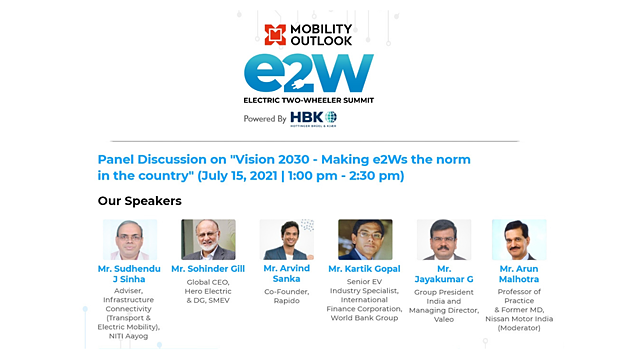
For a sector that contributes a miniscule 1% of overall two-wheeler volumes in the country, electric vehicles don’t particularly project a happy picture. But policy interventions in the past couple of months, both by the Central and state governments, have brought in a much-needed thrust to the sector.
In a panel discussion on “Vision 2030 – Making e2Ws the norm in the country”, organised as part of Mobility Outlook’s Electric Two-Wheeler Summit 2021, panellists welcomed recent developments – both policy-wise and investments-wise, but cautioned about the continuing challenges plaguing the sector.
Sudhendu J Sinha, Adviser, Infrastructure Connectivity (Transport & Electric Mobility), NITI Aayog, said the government will continue to bring in good news for the EV sector in the coming days. He appreciated the initiatives taken by various state governments in the past few months, and said the aspiration among Indian states towards e-mobility is extremely encouraging.
Sohinder Gill, Global CEO, Hero Electric & Director General, Society of Manufacturers of Electric Vehicles (SMEV) said consumers who are entering the showroom to buy electric vehicles have one reason to buy and one reason not to buy EVs. There were issues pertaining to sub-standard products sold in the past, the cost of battery replacement and servicing of vehicles. “We need to overcome these challenges to make e2Ws the norm in the country,” he said.
Jayakumar G, Group President India and Managing Director, Valeo said localisation of vehicles depends upon the demand. However, investments are being made by Tier-1 and Tier-2 suppliers. He said Valeo will invest step by step to increase localisation of EV solutions. Speaking about policies, he said with the FAME schemes, the e2W penetration will increase in the country.
China is leading the EV market globally, but India is way ahead if we exclude it from other developing countries, said Kartik Gopal, Senior EV Industry Specialist, International Finance Corporation, World Bank Group. “The whole journey of policy evolution is way ahead of them. We are far more mature and progressive in this scenario,” said Gopal.
Bike taxi aggregator, Rapido is excited about the opportunity. Arvind Sanka, Co-Founder, Rapido said the company is planning to introduce 4,000-5,000 e2Ws in the next six months. “We see a change in consumer behaviour as they are now looking at the total cost of ownership in operating these vehicles,” he said.
Gill added that business opportunities are not just in building EVs. But start-ups nowadays should think about what’s behind the vehicle and think about the battery management systems, connectivity, motors and other components.
Liberal estimates
Concluding the session, Arun Malhotra, auto industry expert and Former MD, Nissan Motor India, who moderated the discussion, asked he panellists to put a number to the likely penetration of e2Ws in the overall two-wheeler segment by 2030. The estimates from the panel varied from being conservative to being liberal.
Considering the way the industry is currently moving, Gill took a conservative view to predict about 10% or less penetration by 2030. However, it will be 15 to 20% if certain initiatives are taken within the six months. Listing out the initiatives, he said, like Swatch Bharat, there should be a movement called Swatch Vayu, and have up to 400,000 charging stations across each state, and train 100,000 mechanics.
While refusing to pinpoint a specific number, Sinha said the government can’t mandate; instead, it is better to guide, motivate and mentor, to accomplish the goals.
Referring to an internal study, Jayakumar said EVs will likely account for 28% of the overall two-wheeler segment in the country by 2030. “I think this itself is a conservative figure, considering the revised FAME II policy. Clearly, CO2 emission reduction is going to be significant with electrification,” he said.
Gopal said that with the way the world looking at going away from fossil fuel picking up momentum, 30% level itself is conservative. Sanka agreed with Jayakumar and Gopal from the commercial use case point of view.
“Today, we are just 1% and to achieve 30% growth, the industry has to grow exponentially. It can happen. If we miss the opportunity, then history will blame us,” concluded Malhotra.
Technical sessions
Earlier, a technical session on Product & Design (Part 1) saw participation from by Ranoji M Khochare, Application Engineer, HBK; Ankit Adhiya, Senior Manager – Electrification and Tushar Sambharam, Principal Electrification Solution Specialist, both from Ansys Software and Khushwant Pawar, Head, Cybersecurity Solutions – Mobility, ETAS Automotive India.
Concluding the day was Product and Design (Part 2). The speakers included Ram Bhavaraju, Head of Software Development, Ather Energy and Anuj Prasad, Founder & CEO, Desmania Design.
Today’s schedule
Today’s schedule of the e2W Summit includes a panel discussion on “EV Retail – Developing an appropriate go-to-market strategy”, which will be followed by a session on Battery & Motors and a special address by Mahua Acharya, Managing Director & CEO, Convergence Energy Services Limited, Govt of India.
The valedictory address will be delivered by Chetan Maini, Founder & Vice Chairman, SUN Mobility, while Sohinder Gill will deliver the concluding address.